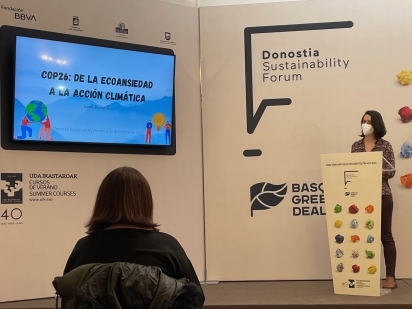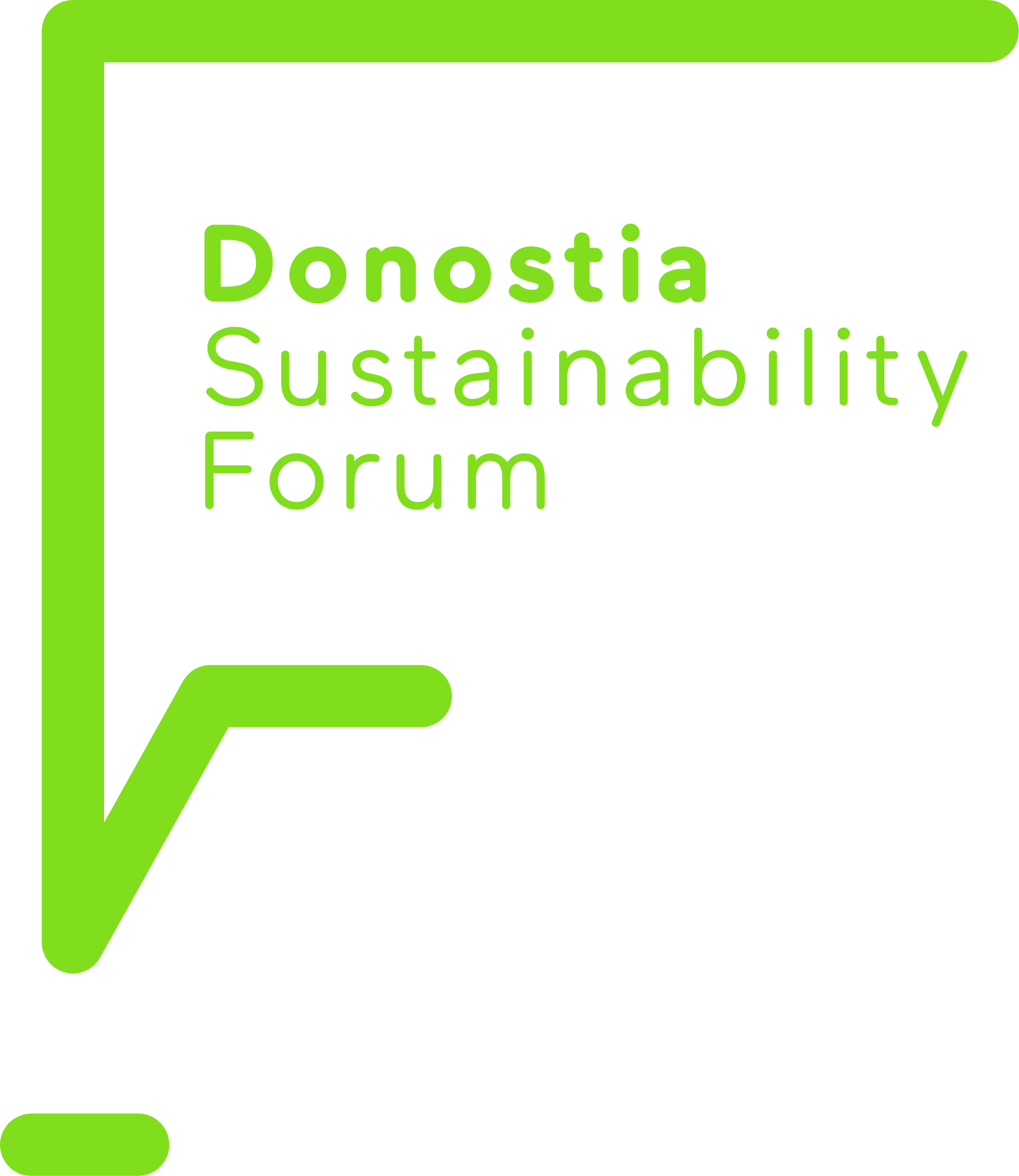"We are no longer talking about saving the planet, what we need to talk about is the human lives that are in danger because of the climate crisis"
<p> Just back from Glasgow, where she attended COP-26, the United Nations climate conference, the environmental journalist and author of the book "Ecoansias" Irene Baños closed the open days programme of the Donostia Sustainability Forum with a conference on eco-anxiety and climate action.</p>

Throughout her presentation, and in the subsequent dialogue, Irene Baños placed special emphasis on the importance of environmental education and information for citizens to understand the magnitude of the problem facing humanity. "These are not abstract impacts, it affects people very directly: migrations caused by climate change, famine, disease and economic losses," she explained.
"We are no longer talking about saving the polar bear, or the planet, what we need to talk about is the human lives that are at risk from the climate crisis. It's not that we are going to become extinct, but we need to think about the level of suffering we are willing to accept." She added that it is never too late to act, "although the longer we wait, the worse the consequences will be".
COP 26 - Success or failure?
Although the final outcome of the Glasgow summit was somehow disappointing, Irene Baños was optimistic about what had been achieved. "Much remains to be done, but progress has been made. Progress that has been little talked about in the media. Among these advances, she highlighted the fact that, for the first time, it has been made clear that the goal to be achieved is that the global temperature of the planet should rise by only 1.5 degrees Celsius with respect to data prior to the industrial revolution. A more ambitious objective than that agreed in the Paris Agreement.
To achieve this goal, the Glasglow Agreement proposes a 45% reduction in CO2 emissions by 2030. In addition, the signatory countries are committed to presenting their plans to make progress on their objectives on an annual basis. And the most talked about issue, as the journalist pointed out, is that for the first time in the history of the climate negotiations organised by the UN, fossil fuels are directly mentioned as being responsible for climate change, although at the last minute it was decided to point out in the text of the agreement the need to reduce the use of coal instead of the original wording, which spoke of eliminating it. "We are late, we are going badly, but there is reason for hope," said Irene Baños.
This optimism, this idea of thinking that "we are better off than we were" is one of the issues to be taken into account in order not to fall into eco-anxiety, described as the fear of the consequences of an environmental cataclysm and the anxiety caused by the impotence of not being able to avoid it. Irene Baños herself acknowledges that she wrote "Ecoansias" when she herself felt overwhelmed by the amount of negative information she was confronted with on a daily basis. That is why she proposes to turn this concern for the environment into climate action.
"We have to leave room for optimism because at these summits you see how many people are working for change. The biggest failure would be to let ourselves be devoured by failure and the loneliness that comes with eco-anxiety.
"Too many doom and gloom headlines are made, but too little is said about what can be done, and citizens need to be more empowered. We need to tell them what is being done and what can be done", and she added that this frustration, this fear of environmental catastrophe "can be converted into transforming action". In this sense, environmental communication and education is very important for publicising activities and initiatives that bring about change.
From eco-anxiety to climate action
Irene Baños defined three principles for transforming frustration into climate action:
- Communicate to the people around us our concerns and talk about climate change at every opportunity, attracting media attention and making this issue part of everyday conversations.
- Shake off the guilt, trying to do everything perfectly on issues such as recycling or sustainable consumption generates anxiety.
- Join in collective action, such as consumer groups, energy communities and programmes for dialogue and debate..
Three principles and a lot of actions in different directions. As she explained, "we have to reduce consumption, we cannot make an energy transition at current levels. We cannot simply replace every combustion car with an electric car, because there are no resources or raw materials to do so. We have to generate a circular system.
Nor is it enough to replace all the products we consume with ones that carry the bio or eco label if we continue at the current rate. "The way we consume is not sustainable, no matter where the raw material comes from. In this sense, she referred to products advertised for consumption with a clear conscience, such as biofuels, which are causing food crises in other countries. "The basic system has to be changed, and that is what is complicated, because no company is interested in saying that you consume less". In this sense, he stressed the importance of environmental education, to distinguish what is climate action from what is just marketing. "This basic change must come from legislation, which obliges companies, and from environmental education".
Asked whether consuming less would improve our quality of life, she answered with a resounding yes. "We would have a better quality of life with a different kind of growth. We are in a kind of loop in which the speed at which we live generates more precariousness. The quality of life is getting worse and worse, we have less and less time to cook, to move around, and this has repercussions on the way we consume. Young people are living increasingly precarious lives. This so-called growth model is not working.
Irene Baños also offered a topic for thought. It is urgent to act, but "this urgency must be managed with slow haste. We need to slow down the rate at which we produce, consume and discard".



